News and links on the COVID-19 pandemic for Darien:
LATEST UPDATES: Town-by-town COVID-19 positive-test cases; Governor’s daily briefing for Sunday; Aid upped for Connecticut nursing homes; Seven Northeast governors appoint multi-state council to advise on reopening economy.
See also:
SUNDAY State Statistics on COVID-19 Cases in Lower Fairfield County
Sunday, April 19 — As of Sunday, the state reports 139 Darienites were identified with COVID-19, the same as the day before and the day before that, according to information released by state authorities. (Reminders: Many people are thought to have the COVID-19 virus who aren’t identified; the state says “all figures are preliminary and subject to change.”)
Here’s the number of identified cases in nearby communities, according to the state government Coronavirus statistics updates Web page:
Stamford — 1,758 cases (10 more than the 1,748 on Saturday)
Norwalk — 858 (one more than the 857 on Saturday)
New Canaan — 102 (one more than the 101 on Saturday)
Greenwich — 372 (the same as on Saturday; no new cases)
Westport — 184 (the same as on Saturday; no new cases)
Wilton — 103 (the same as on Saturday; no new cases)
Weston — 44 (the same as on Saturday; no new cases)
Ridgefield — 137 (the same as on Saturday; no new cases)
Fairfield — 261 (four more than the 257 on Saturday)
Bridgeport — 1,230 (231 more than the 1,199 on Saturday)
TEN WORST HIT CONNECTICUT MUNICIPALITIES (with total cases): 1. Stamford (1,758), 2. Bridgeport (1,230), 3. New Haven (1,041), 4. Norwalk (858), 5. Danbury and Waterbury, a tie (843), 6. Hartford (616), 7. West Haven (454), 8. Hamden (391), 9. Stratford (392), 10. Greenwich (372)
SUNDAY: COVID-19 Briefing by Gov. Lamont
Sunday, April 19 —As the State of Connecticut continues taking actions in response to the global spread of coronavirus disease (COVID-19), Governor Ned Lamont provided the following updates as of 5 p.m. on Sunday, April 19, 2020:
Data updates on testing in Connecticut
The following is a summary of the day-to-day newly reported data on cases, deaths, and tests in Connecticut. It is important to note that these newly reported updates include data that occurred over the last several days to a week. All data in this report are preliminary, and data for previous dates will be updated as new reports are received and data errors are corrected.
“For the second straight day, the number of people hospitalized in Connecticut due to complications caused by COVID-19 has slightly decreased, another step in the right direction and another sign that the efforts we’ve been taking as a community are having an impact on slowing the outbreak,” Governor Lamont said. “Whether this continues is dependent upon on the actions each of us takes over the next several days and weeks. This isn’t over – we lost another 41 Connecticut residents, and we mourn for their lives. Together, we can have an impact on flattening the curve, but if people tell you the pandemic has ended – they are wrong.”
| Overall Summary | Statewide Total | Change Since Yesterday |
| Laboratory-Confirmed COVID-19 Cases | 17,962 | +412 |
| COVID-19-Associated Deaths | 1,127 | +41 |
| Patients Currently Hospitalized with COVID-19 | 1,901 | -37 |
| Patients tested for COVID-19 | 59,759 | +1,546 |
County-by-county breakdown:
| County | Laboratory-Confirmed COVID-19 Cases | Laboratory-Confirmed COVID-19 Hospitalizations | Laboratory-Confirmed COVID-19-Associated Deaths |
| Fairfield County | 7,434 | 746 | 447 |
| Hartford County | 3,351 | 420 | 295 |
| Litchfield County | 600 | 27 | 48 |
| Middlesex County | 462 | 33 | 40 |
| New Haven County | 4,871 | 633 | 257 |
| New London County | 339 | 26 | 10 |
| Tolland County | 276 | 12 | 24 |
| Windham County | 100 | 4 | 2 |
| Pending address validation | 529 | 0 | 4 |
| Total | 17,962 | 1,901 | 1,127 |
For several additional graphs and tables containing more data, including a list of cases in every municipality, visit ct.gov/coronavirus.
Governor Lamont expands financial assistance for Connecticut’s nursing homes
Governor Lamont today announced that he is directing his administration to boost Medicaid payments for all of Connecticut’s 215 nursing homes by 15 percent, providing an additional $65 million to these facilities amid the COVID-19 pandemic.
“Connecticut’s nursing home operators and their employees provide an incredible service to the people of our state, including for the 22,000 residents that receive direct care in nursing homes on a daily basis,” Governor Lamont said. “I want to extend my profound gratitude to them, particularly during this unprecedented global pandemic that is having a particularly adverse impact on the elderly and individuals with disabilities residing in long-term care settings.”
The state’s increased financial support will be applied toward:
- Employee wages, including staff retention bonuses, overtime, and shift incentive payments;
- New costs related to screening of visitors;
- Personal protective equipment;
- Cleaning and housekeeping supplies; and
- Other costs related to COVID-19.
The expanded state aid is in addition to the enhanced federal support nursing homes are expected to receive through Medicare, as well as general relief under the recently adopted Coronavirus Aid, Relief, and Economic Security (CARES) Act.
For more information, read the press release issued today by Governor Lamont.
State begins site visits to every nursing home in Connecticut to extend additional support
To provide additional support to the state’s nursing homes and long-term care facilities, the Connecticut Department of Public Health has announced that its staff will be making physical, on-site visits to all of Connecticut’s 215 nursing homes and long-term care facilities over the next seven to ten days. The department’s Healthcare Quality and Safety Branch, with guidance from the Centers for Medicare and Medicaid Services, will conduct infection control surveys during each visit. This will be a first among states in the region, as all nurses in the Facility Licensing and Investigations Section have been fit-tested for N95 respirators, which is a federal requirement.
To view the form that will be used during these site visits, click here.
Governor Lamont encourages residents to sign up for the state’s CTAlert notification system
Governor Lamont is encouraging Connecticut residents to sign up for CTAlert, the state’s emergency alert system, which provides text message notifications to users. To subscribe, text the keyword COVIDCT to 888-777.
Providing information to Connecticut residents
For the most up-to-date information from the State of Connecticut on COVID-19, including an FAQ and other guidance and resources, residents are encouraged to visit ct.gov/coronavirus.
Individuals who have general questions that are not answered on the website can also call 2-1-1 for assistance. The hotline is available 24 hours a day and has multilingual assistance and TDD/TTY access. It intended to be used by individuals who are not experiencing symptoms but may have general questions related to COVID-19. Anyone experiencing symptoms is strongly urged to contact their medical provider.
Gov Boosts Medicaid Payments to All CT Nursing Homes
Sunday, April 19 — An announcement on Sunday from the Governor’s Office:
Governor Ned Lamont today announced that he is directing his administration to boost Medicaid payments for all of the state’s 215 nursing homes by an additional 5 percent above the recently announced ten percent increase. Together, the 15 percent across-the-board financial relief will provide an additional $65 million in Medicaid payment increases to the state’s nursing homes.
The administration notified nursing home association leaders and representatives of the nursing home employees’ union in letters that were delivered this weekend.
“Connecticut’s nursing home operators and their employees provide an incredible service to the people of our state, including the 22,000 residents receive direct care in nursing homes on a daily basis,” Lamont said. “I want to extend my profound gratitude to them, particularly during this unprecedented global pandemic that is having a particularly adverse impact on the elderly and individuals with disabilities residing in long-term care settings.”
The state’s increased financial support will be applied toward:
- Employee wages, including staff retention bonuses, overtime, and shift incentive payments;
- New costs related to screening of visitors;
- Personal protective equipment;
- Cleaning and housekeeping supplies; and
- Other costs related to COVID-19.
In addition, in recognition of the continuing needs of nursing homes during this crisis, the Lamont administration is also announcing implementation of the following additional measures to the state’s Medicaid program:
- The state will provide an across-the-board rate increase of 10 percent for non-COVID beds, retroactive to March 1 (previously, the 10 percent increase was to take affect April 1).
- The state will provide an additional across-the-board rate increase of 5 percent for non-COVID beds for the period of April 1 through June 30, bringing the total increase during this period of 15 percent.
- The state will reimburse at $400 per day for COVID-positive residents in non-COVID recovery facilities. This rate is in effect for a maximum of 30 days per bed.
- The state’s advance of $11.6 million from the initial 10 percent rate increase, which was received by skilled nursing facilities on April 7, is now being extended back to March 1 – adding $12 million in immediate revenue.
The state is also assisting with start-up costs and $600 per-day payment to all facilities that are designated by the Department of Public Health as suitable to be re-opened for the purpose of serving residents with COVID-19 who are being discharged from hospitals and who need nursing home level of care.
Altogether, the extra across-the-board Medicaid payments for all nursing homes totals $65 million. Another $15.4 million is dedicated to special nursing home services for COVID-positive residents.
In addition to the increased state assistance, it is also anticipated that nursing homes will receive enhanced support through the federal government from Medicare, a program wholly administered by the Centers for Medicare and Medicaid Services.
For example, a significant percentage of symptomatic COVID-positive nursing home residents will be able to shift over to Medicare coverage at the Medicare per diem (estimated at $536), providing financial relief to the nursing home industry.
The federal government is also providing general relief for all Medicare providers under the recently adopted Coronavirus Aid, Relief, and Economic Security (CARES) Act that is expected to provide substantial resources to nursing home facilities.
State begins site visits to every nursing home in Connecticut to extend additional support
To provide additional support to the state’s nursing homes and long-term care facilities, the Connecticut Department of Public Health has announced that its staff will be making physical, on-site visits to all of Connecticut’s 215 nursing homes and long-term care facilities over the next seven to ten days.
The department’s Healthcare Quality and Safety Branch, with guidance from the Centers for Medicare and Medicaid Services, will conduct infection control surveys during each visit.
This will be a first among states in the region, as all nurses in the Facility Licensing and Investigations Section have been fit-tested for N95 respirators, which is a federal requirement.
To view the form that will be used during these site visits, click here.
Governors Appoint Members of Multi-State Council to Restore Economy
Sunday, April 19 — Governor Ned Lamont of Connecticut, Governor Andrew M. Cuomo of New York, Governor Charlie Baker of Massachusetts, Governor Gina Raimondo of Rhode Island, Governor Phil Murphy of New Jersey, Governor Tom Wolf of Pennsylvania, and Governor John Carney of Delaware today announced their appointees that will serve on the multi-state, regional council to restore the economy and get people back to work.
The appointees include one health expert, one economic development expert, and the respective chief of staff from each state.
Governor Lamont stressed that in Connecticut, this multi-state council is a separate entity from the Reopen Connecticut Advisory Group, which is the localized, Connecticut-based panel of health, business, and education experts that will consult with the Lamont administration and the state’s legislative leaders on the re-opening of the economy.
Members who will serve on the Reopen Connecticut Advisory Group are in the process of being appointed and will be announced in the coming days.
The appointees from each state serving on the regional, multi-state council include:
Connecticut
- Dr. Albert Ko: Professor of Epidemiology and Medicine and department chair at the Yale School of Public Health
- Indra Nooyi: Co-chair of the nonprofit organization AdvanceCT and former chairman and CEO of PepsiCo
- Paul Mounds, Jr.: Chief of Staff for the Office of Governor Ned Lamont
New York
- Michael Dowling: President and CEO of Northwell Health
- Robert Mujica: Director of NYS Division of the Budget
- Melissa DeRosa: Secretary to Governor Andrew M. Cuomo
Massachusetts
- Lauren Peters: Undersecretary at the Executive Office of Health and Human Services
- Michael Kennealy: Secretary of the Executive Office of Housing and Economic Development
- Kristen Lepore: Chief of Staff for the Office of Governor Charlie Baker
Rhode Island
- Nicole Alexander-Scott, MD, MPH: Director of the Rhode Island Department of Health
- Stefan Pryor: Rhode Island Commerce Secretary
- David Ortiz: Chief of Staff for the Office of Governor Gina Raimondo
New Jersey
- Dr. Richard Besser: President and CEO of the Robert Wood Johnson Foundation and former acting director of the Centers for Disease Control and Prevention
- Jeh Johnson: Former Secretary of Homeland Security under President Barrack Obama
- George Helmy: Chief of Staff for the Office of Governor Phil Murphy
Pennsylvania
- Dr. Rachel Levine: Secretary of the Department of Health
- Dennis Davin: Secretary of the Department of Community and Economic Development
- Michael Brunelle: Chief of Staff for the Office of Governor Tom Wolf
Delaware
- Dr. Kara Odom Walker: Secretary for the Delaware Department of Health and Social Services
- Kurt Foreman: President and CEO of the Delaware Prosperity Partnership
- Sheila Grant: Chief of Staff for the Office of Governor John Carney
Governor Lamont said, “One thing that’s undeniable is that this virus does not stop at the border of any county, state, or country, but the impact is the same when it comes to our respective economies and healthcare systems. Working as a regional coalition to make the right decisions will lead to the best public health results for all of our residents. We must solve these problems together.”
Governor Cuomo said, “We have been collaborating closely with our neighboring states to combat this pandemic through a uniform approach to social distancing and density reduction and it has been working well. Now it is time to start opening the valve slowly and carefully while watching the infection rate meter so we don’t trigger a second wave of new infections. This is not a light switch that we can just flick on and everything goes back to normal – we have to come up with a smart, consistent strategy to restart the systems we shut down and get people back to work, and to the extent possible we want to do that through a regional approach because we are a regional economy. New York is partnering with these five states to create a multi-state council that will come up with a framework based on science and data to gradually ease the stay at home restrictions and get our economy back up and running.”
Governor Baker said, “The Baker-Polito administration looks forward to participating in discussions with neighboring states and experts regarding the ongoing response to the COVID-19 pandemic. Massachusetts also remains focused on efforts to expand testing, ensure hospital capacity and provide the necessary PPE to those on the front lines to slow the spread of COVID-19 in our communities.”
Governor Raimondo said, “States are taking the lead as we fight to slow the spread of coronavirus and save lives. I’m proud of the steps we’ve taken, and I’m constantly thinking about what it will take to safely reopen our economy. But we know that this virus does not recognize borders, and it’s clear we need a strong, coordinated regional approach to avoid a second wave of this disease. I’m grateful to my fellow governors for their leadership during this crisis and I’m confident that this new partnership will support our efforts to get Rhode Islanders – and all Americans – back to work safely.”
Governor Murphy said, “No one has given more thought or is more eager to restart our economy than I am, but if we don’t get the sequencing right, we put more lives at risk. The only path to a sustainable economic recovery is through a strong healthcare recovery. Then, and only then, do we position ourselves to fully ignite our economy and get the residents of our state back to work while minimizing the danger of this disease. A coordinated, regional approach, informed by a multi-state council of experts, will help us avoid a major setback with potentially disastrous consequences. I look forward to the day when the facts on the ground allow us to ease our restrictions and move our regional economy forward.”
Governor Wolf said, “Our highest priority remains protecting the health and safety of Pennsylvanians. While my administration continues to take critical steps to mitigate the spread of COVID-19, I also recognize that we must look ahead and take a measured, careful approach to prepare for the future while ensuring that we don’t undo all of our efforts. Pennsylvania will work collaboratively with our partners both in state and in surrounding states to develop a comprehensive strategy that first focuses on health but also addresses the need to gradually restore our economy.”
Governor Carney said, “We still have a situation in Delaware that is getting worse. Infections of COVID-19 and hospitalizations are rising. Delawareans should stay home. Don’t go out in public unnecessarily. Don’t visit Delaware unless you need to see a doctor, or care for a family member. You’ll only increase everyone’s risk. At the same time, we need to look forward. We need a consistent approach for moving our states out of this crisis, when that day comes. I’m grateful for the partnership of my fellow Governors in the region. They are all working around-the-clock to prevent surges in COVID-19 cases, protect hospital capacity for the most critically-ill patients, and save lives. We’ll get through this by working together.”
SATURDAY State Statistics on COVID-19 Cases in Lower Fairfield County
Saturday, April 18 — As of Friday, the state reports 139 Darienites were identified with COVID-19, the same as the day before, according to information released by state authorities. (Reminders: Many people are thought to have the COVID-19 virus who aren’t identified; the state says “all figures are preliminary and subject to change.”)
First Selectman Jayme Stevenson didn’t publish new COVID-19 positive-test-result numbers on Friday. The data she’s getting often comes in earlier than the data published by the state.
Here’s the number of identified cases in nearby communities, according to the state government Coronavirus statistics updates Web page:
Stamford — 1,748 cases (35 more than the 1,713 on Friday)
Norwalk — 857 (13 more than the 844 on Friday)
New Canaan — 101 (one more than the 100 on Friday)
Greenwich — 372 (two more than the 370 on Friday)
Westport — 184 (one more than the 183 on Friday)
Wilton — 103 (two more than the 101 on Friday)
Weston — 44 (one more than the 43 on Friday)
Ridgefield — 137 (three more than the 134 on Friday)
Fairfield — 257 (four more than the 253 on Friday)
Bridgeport — 1,199 (88 more than the 1,121 on Friday)
TEN WORST HIT CONNECTICUT MUNICIPALITIES (with total cases): 1. Stamford (1,713), 2. Bridgeport (1,199), 3. New Haven (1,001), 4. Norwalk (857), 5. Danbury (841),6. Waterbury (837), 7. Hartford (591), 8. West Haven (438), 9. Hamden (381) 10. Greenwich (372)
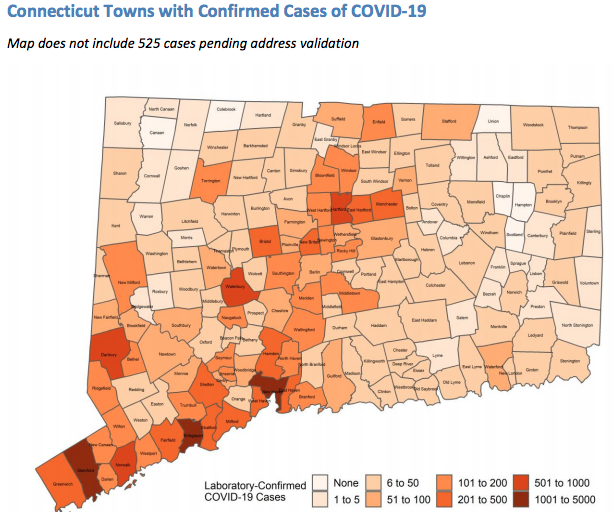
Image from the state government website
Community-by-community COVID-19 positive test results for Saturday, April 18, 2020
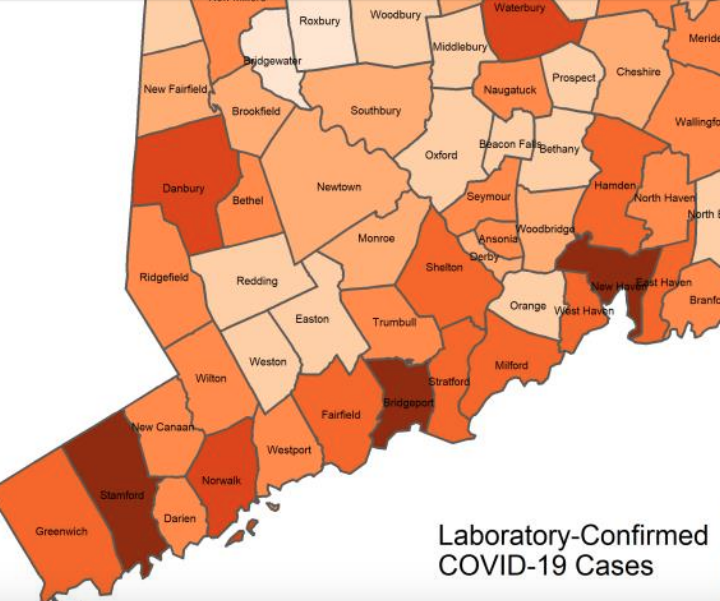
Closeup of the map above, showing COVID-19 positive test results community by community across the state, as of Saturday, April 18, 2020.
SATURDAY: COVID-19 Briefing by Gov. Lamont
Saturday, April 18 — As the State of Connecticut continues taking actions in response to the global spread of coronavirus disease (COVID-19), Gov. Ned Lamont provided the following updates as of 5 p.m. on Saturday, April 18, 2020:
Data updates on testing in Connecticut
The following is a summary of the day-to-day newly reported data on cases, deaths, and tests. It is important to note that these newly reported updates include data that occurred over the last several days to a week. All data in this report are preliminary, and data for previous dates will be updates as new reports are received and data errors are corrected.
“For the first time since the start of this pandemic, today we saw the number of COVID-19 positive patients in our hospitals decline,” Governor Lamont said. “This is providing us with some hope, and is a sign that our social distancing measures are having an impact. But one day of data alone does not mean we are out of the woods and can return to life as normal. Many of our hospitals and nursing homes remain under great stress, and our front line workers continue to battle this virus around the clock. But we have shown that with proper measures in place, we can slow down the spread of the virus.”
| Overall Summary | Total | Change Since Yesterday |
| Laboratory-Confirmed COVID-19 Cases | 17,550 | +741 |
| COVID-19-Associated Deaths | 1,086 | +50 |
| Patients Currently Hospitalized with COVID-19 | 1,938 | -8 |
| Patients tested for COVID-19 | 58,213 | +2751 |
County-by-county breakdown:
| County | Laboratory-Confirmed COVID-19 Cases | Laboratory-Confirmed COVID-19 Hospitalizations | Laboratory-Confirmed COVID-19-Associated Deaths |
| Fairfield County | 7,363 | 776 | 432 |
| Hartford County | 3,196 | 417 | 289 |
| Litchfield County | 593 | 30 | 48 |
| Middlesex County | 448 | 36 | 37 |
| New Haven County | 4,743 | 638 | 241 |
| New London County | 315 | 23 | 10 |
| Tolland County | 270 | 14 | 24 |
| Windham County | 97 | 4 | 2 |
| Pending address validation | 525 | 0 | 3 |
| Total | 17,550 | 1,938 | 1,086 |
For several additional graphs and tables containing more data, including a list of cases in every municipality, visit ct.gov/coronavirus.
Approximately 612 tests completed yesterday at newly launched rapid testing center in New Haven
Approximately 612 tests were completed during the first day of operations at the rapid COVID-19 testing center that opened Friday at the site of the former Gateway Community College campus in New Haven. Operated as a public-private partnership between the State of Connecticut and CVS Health, with support from the City of New Haven, it is estimated that about 750 tests can be performed at the site each day, seven days per week.
The rapid test center uses the new Abbott ID NO COVID-19 test, which provides results in 30 minutes, from the collection of the swab to the delivery of the results. Tests are provided at no cost to all patients.
Anyone interested in being tested must register online and make an appointment prior to arriving at the test site. Unlike the state’s other testing centers, patients do not need to be referred by a doctor prior to being tested. To make an appointment, visit www.cvs.com/minuteclinic/covid-19-testing.
New partnerships formed to expedite loan processing and payments under the Connecticut Recovery Bridge Loan Program
The Connecticut Department of Economic and Community Development (DECD) has formed partnerships with SoFi, a leading online personal finance company, and Equifax, a global data, analytics and technology company, to expedite loan processing and payments – and lower costs – under the Connecticut Recovery Bridge Loan Program.
The $50 million program was created by DECD to provide cash flow relief to small businesses and nonprofits negatively impacted by COVID-19. The DECD program has already received over 5,000 applications.
While DECD will make all lending decisions, SoFi will utilize its advanced technology capabilities to expedite all loan processing and facilitate fulfillment to ensure borrowers receive their financial assistance in a timely fashion. Equifax differentiated data assets lend further support to the program to improve the process by validating required information of recipients, credit and bank accounts. These partnerships will help DECD meet the goal to make payments by the end of April. In addition to being more efficient, this new approach lowers costs by automating the closing process.
SoFi, which has over one million members, is providing these third-party services to support Connecticut and this important COVID-19 relief program as part of its larger mission to help people get their money right. Equifax blends unique data, analytics, and technology with a passion for serving customers globally and a commitment to helping people and businesses live their financial best.
Governor Lamont encourages residents to sign up for the state’s CTAlert notification system
Governor Lamont is encouraging Connecticut residents to sign up for CTAlert, the state’s emergency alert system, which provides text message notifications to users. To subscribe, text the keyword COVIDCT to 888-777.
Providing information to Connecticut residents
For the most up-to-date information from the State of Connecticut on COVID-19, including an FAQ and other guidance and resources, residents are encouraged to visit ct.gov/coronavirus.
Individuals who have general questions that are not answered on the website can also call 2-1-1 for assistance. The hotline is available 24 hours a day and has multilingual assistance and TDD/TTY access. It intended to be used by individuals who are not experiencing symptoms but may have general questions related to COVID-19. Anyone experiencing symptoms is strongly urged to contact their medical provider.
FRIDAY State Statistics on COVID-19 Cases in Lower Fairfield County
Friday, April 16 — As of Friday, the state reports 139 Darienites were identified with COVID-19, two more than the day before, according to information released by state authorities. (Reminders: Many people are thought to have the COVID-19 virus who aren’t identified; the state says “all figures are preliminary and subject to change.”)
First Selectman Jayme Stevenson didn’t publish new COVID-19 positive-test-result numbers on Friday. The data she’s getting often comes in earlier than the data published by the state.
Here’s the number of identified cases in nearby communities, according to the state government Coronavirus statistics updates Web page:
Stamford — 1,713 cases (93 more than the 1,620 on Thursday)
Norwalk — 844 (23 more than the 821 on Thursday)
New Canaan — 101 (the same number as on Thursday; no new cases)
Greenwich — 370 (six more than the 364 on Thursday)
Westport — 183 (the same number as on Thursday; no new cases)
Wilton — 101 (one more than the 100 on Thursday)
Weston — 43 (one more than the 42 on Thursday)
Ridgefield — 134 (four more than the 130 on Thursday)
Fairfield — 253 (26 more than the 246 on Thursday)
Bridgeport — 1,121 (79 more than the 1,042 on Thursday)
TEN WORST HIT CONNECTICUT MUNICIPALITIES (with total cases): 1. Stamford (1,713), 2. Bridgeport (1,121), 3. New Haven (932), 4. Norwalk (844), 5. Danbury (828),6. Waterbury (822), 7. Hartford (567), 8. Greenwich (370), 9. West Haven (410), 10. Hamden (359)
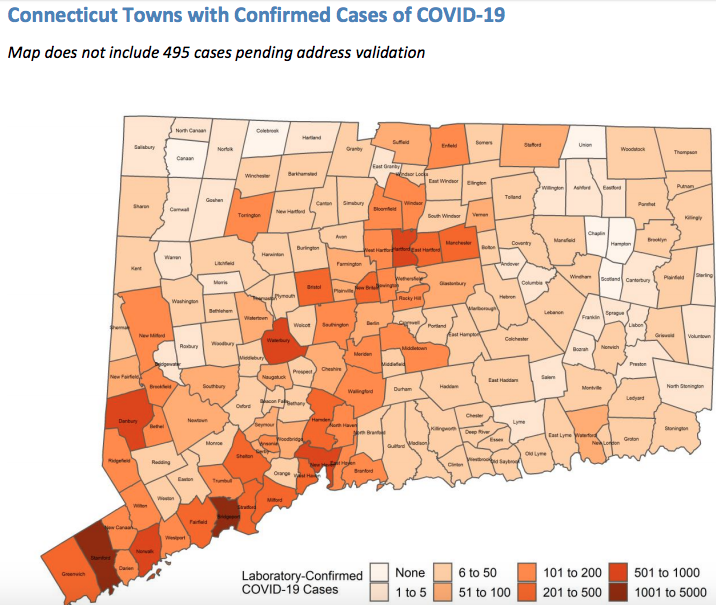
Image from the state government website
The geographic spread of COVID-19 confirmed cases in the state as of Friday, April 17, 2020.
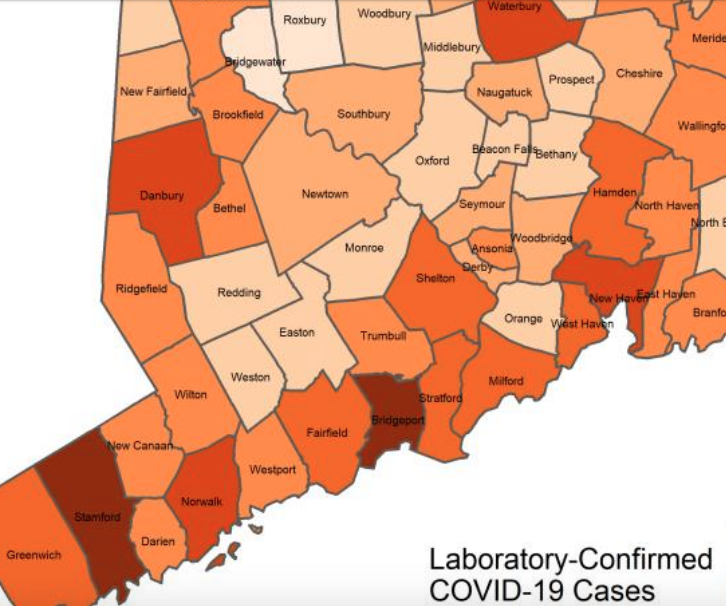
Image from the state government website
Closeup of the map above, showing relative COVID-19 confirmed cases in southwest Connecticut as of Friday, April 17.
FRIDAY COVID-19 Briefing by Gov. Lamont
Saturday, April 17 — As the State of Connecticut continues taking actions in response to the global spread of coronavirus disease (COVID-19), Governor Ned Lamont provided the following updates as of 6:00 p.m. on Friday, April 17, 2020:
Data updates on testing in Connecticut
Since yesterday’s update, an additional 925 positive COVID-19 cases have been reported in Connecticut, bringing the statewide total to 16,809. To date, more than 55,462 patients have been tested in Connecticut. Approximately 1,946 patients are hospitalized. The total statewide total number of COVID-19 associated fatalities is 1,036. It should be noted that the day-to-day changes reflect newly reported cases, deaths, and tests that occurred over the last several days to week.
A county-by-county breakdown includes:
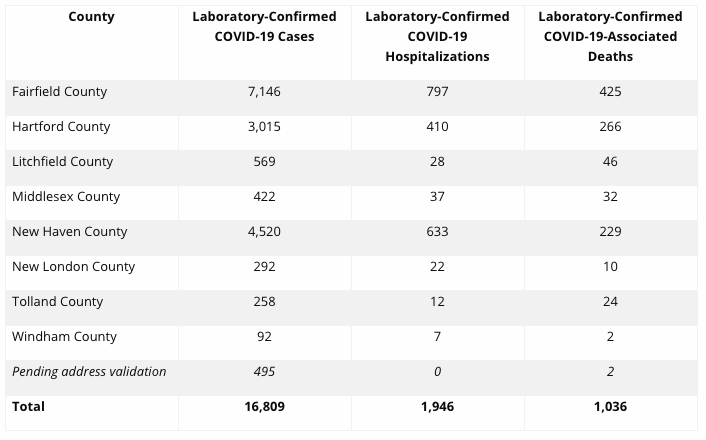
Image from the state government website
County COVID-19 statistics for Friday, April 17
For several additional graphs and tables containing more data, including a list of cases in every municipality, visit ct.gov/coronavirus.
Governor Lamont signs 29th executive order to mitigate the spread of COVID-19
Governor Lamont today signed another executive order – the 29th since he enacted the emergency declarations – that builds upon his efforts to encourage mitigation strategies that slow down transmission of the virus. Executive Order No. 7BB enacts the following provisions:
- Cloth face coverings or higher level of protection required in public wherever close contact is unavoidable: Effective at 8 p.m. on April 21, 2020, any person in a public place in Connecticut who is unable to or does not maintain a safe social distance of approximately six feet from every other person shall cover their mouth and nose with a mask or cloth face-covering. In addition, individuals shall use a mask or cloth face covering when using the services of any taxi, car, livery, ride-sharing or similar service or means of mass public transit, or while within any semi-enclosed transit stop or waiting area. The commissioner of the Department of Economic and Community Development will be required to update the previously issued Safe Workplace rules and Safe Store rules. Nothing in this order shall require the use of a mask or cloth face covering by anyone for whom doing so would be contrary to his or her health or safety because of a medical condition, anyone under the age of 2 years, or by an older child if the parent, guardian or person responsible for the child is unable to place the mask safely on the child’s face. If a person declines to wear a mask or face covering because of a medical condition as described above, such person shall not be required to produce medical documentation verifying the stated condition.
- Further postponement of presidential preference primary to August 11: To protect the health and safety of voters, poll workers, and the most vulnerable members of the population, the presidential primary is ordered rescheduled – for the second time – to August 11, 2020. This is the same date that state and local primaries had already been scheduled to be held. Originally, the primary had been scheduled to be held April 28, and then the governor rescheduled it to June 2 with Executive Order No. 7G. Today’s order supersedes that previously enacted order.
| **Download: Governor Lamont’s Executive Order No. 7BB |
State launches new “Talk It Out” hotline for families to relieve stress of caring for children during pandemic
Parents and caretakers in need of help with the stress and increased needs resulting from caring for their children during the COVID-19 crisis are invited to call the state’s new “Talk It Out” hotline to receive assistance.
An initiative of the Connecticut Department of Children and Families, the hotline provides support from trained professionals who will listen and speak with those in need about their concerns and, if additional help is needed, refer them to responsive services.
Parents and caretakers are invited to call 1-833-258-5011 or visit www.talkitoutct.com.
Governor Lamont said reaching out for support and help is a healthy way for a family to respond to increased stress.
“Seeking help and support at times like these is a sign of strength and hope,” the governor said. “It is normal, and we all need help at times – especially now.”
Children and Families Commissioner Vannessa Dorantes said this effort is an extension of the department’s faith in families and communities.
“We are appreciative of the collaboration between the Department, the United Way and our community partners,” Commissioner Dorantes said. “By using our network of community-based private service providers to talk families through their feelings and connect them to needed services, we are reinforcing our mission to strengthen and empower families. All communities need help right now and we must recognize the additional stress and impact these times present to communities of color. This support line will further increase a family’s inherent strengths while offering timely support during these periods of uncertainty.”
The “Talk It Out” hotline is available Monday through Friday from 8:00 a.m. to 8:00 p.m., and on weekends from 1:00 p.m. to 8:00 p.m. It has both English and Spanish capacity.
AdvanceCT launches second business survey to provide feedback to state policymakers
AdvanceCT, the nonprofit organization that works to advance overall economic competitiveness in Connecticut, today launched a second survey for the state’s businesses with the goal of providing continued feedback to state policymakers regarding how businesses have been impacted by the COVID-19 crisis. Results of the survey will be used to prioritize economic recovery initiatives. The survey is developed in partnership with the Department of Economic and Community Development and the Connecticut Business and Industry Association.
Businesses interested in participating in this survey can access it here: COVID-19 Phase II Business Impact Survey
Banking Commissioner issues COVID-19 stimulus check guidance to Connecticut chartered banks and credit unions
This week Connecticut residents began to see their stimulus money directly deposited into their accounts. In keeping with the intent of the program that these monies be used to meet the basic needs of residents, Banking Commissioner Jorge Perez issued guidance to Connecticut state-chartered financial institutions urging them to not use stimulus funds deposited into accounts to offset outstanding debts customers and members may have with their financial institution. The guidance comes in response to Governor Lamont’s continuing directive to state agencies to identify ways to assist Connecticut residents.
“As stimulus checks begin to reach Connecticut residents, we want to be sure the money is used for its intended purpose,” Commissioner Perez said. “Many people are now finding it difficult to meet basic needs, like food, medicine and housing. It is in this spirit that we issued our guidance to Connecticut state-chartered banks and credit unions. Connecticut financial institutions have been a great partner during this public health emergency. I applaud those institutions who were proactive in establishing similar policies before checks were issued. We appreciate everyone’s continued support.”
The guidance urges Connecticut state-chartered banks and credit unions to not use a stimulus payment to satisfy an overdraft that existed prior to a stimulus payment being deposited to the account, or to exercise rights of offset against the account with respect to other debts. The guidance covers a period of 30 days from the date the stimulus payment is deposited to the account, and financial institutions are strongly encouraged to document any offset with the express agreement of the customer or member. If a financial institution’s systems automatically apply a stimulus payment to an account overdraft, the financial institution is urged to reverse the application of the stimulus payment as promptly as possible.
Consumers are urged to reach out to their financial institutions with questions. They may also request assistance through the Department of Banking’s website.
To read the full guidance, click here.
Department of Revenue Services launches assistance program to help taxpayers impacted by COVID-19
The Connecticut Department of Revenue Services (DRS) has launched a new assistance program specifically designed to help taxpayers subject to current DRS collections matters who have been impacted by the COVID-19 pandemic.
The DRS Priority One Taxpayer Assistance Program (Priority One) is available to business and individual taxpayers who may be unable to meet their current collections obligations due to the COVID-19 pandemic. Any taxpayer who is the subject of a payment plan, bank warrant, wage execution, or other levy by DRS and needs relief or assistance because of the impact of COVID-19, can contact DRS directly to speak to a tax professional.
“Every person and business has been impacted by COVID-19. It is important now, more than ever, for taxpayers to know DRS is committed to working with them,” Acting Revenue Services Commissioner John Biello said. “In keeping with the DRS mission of providing the highest level of customer service, this new program connects taxpayers with a DRS professional, who will review individual circumstances and determine what relief may be available.”
Anyone in need of assistance can contact the DRS Priority One Taxpayer Assistance Program via:
- Phone: 860-541-7650 (Monday to Friday, 8:30 a.m. to 4:30 p.m.)
- Email: DRSPriorityOne_CollectionsAssist@po.state.ct.us
In order to assist DRS in evaluating email inquiries, taxpayers are encouraged to provide as much information as possible about their situation and the relief that is being sought.
For more information, read the press release issued today by the Department of Revenue Services.
Governor Lamont encourages residents to sign up for the state’s CTAlert notification system
Governor Lamont is encouraging Connecticut residents to sign up for CTAlert, the state’s emergency alert system, which provides text message notifications to users. To subscribe, text the keyword COVIDCT to 888-777.
Providing information to Connecticut residents
For the most up-to-date information from the State of Connecticut on COVID-19, including an FAQ and other guidance and resources, residents are encouraged to visit ct.gov/coronavirus.
Individuals who have general questions that are not answered on the website can also call 2-1-1 for assistance. The hotline is available 24 hours a day and has multilingual assistance and TDD/TTY access. It intended to be used by individuals who are not experiencing symptoms but may have general questions related to COVID-19. Anyone experiencing symptoms is strongly urged to contact their medical provider.
Stamford Hospital President on Help the Hospital is Receiving and How You Can Help
Friday, April 17 — How Stamford Hospital has made changes to better fight COVID-19, what help its received and what you can do to help were addressed by Kathleen Silard, president and CEO of the hospital in this recent “letter to our community” on the organization’s website:
As the COVID-19 pandemic continues to spread and severely impact our region, I want to share my perspective regarding what we are facing.
The United States is now at the center of this global health crisis, and nearby New York City is the epicenter. Here in Stamford, we have more cases than any other Connecticut city or town, and Stamford Health is continuing to accelerate and intensify efforts in line with our vision to be the most trusted healthcare partner for the communities we serve.
WE ARE BRINGING RESOURCES FROM ACROSS THE STATE TO STAMFORD
The magnitude of this crisis is larger than any single hospital or community can handle on its own. In recent weeks we converted operating rooms into COVID-19–safe environments, established four new intensive care units to care for those severely impacted by the disease, procured hundreds of thousands of pieces of personal protective equipment (PPE) to safeguard patients and staff, and taken countless other steps to prepare for today and tomorrow.
We recognized early on that collaboration across the state was critical to caring for the people of Stamford and our region. Today, we are actively collaborating with Americares and hospitals from across Connecticut to bring much needed staff and supplies to Stamford, and we are gratified that Governor Lamont has deployed the Connecticut National Guard to Stamford Health’s Bennett Medical Center Campus (home to Stamford Hospital, the Bennett Cancer Center and more). The National Guard provided assistance in creating an additional patient care space. In addition, the U.S. Army Reserve’s Urban Augmentation Medical Task Force clinicians will work side-by-side with Stamford Health to take care of our community.
YOU HAVE AN IMPORTANT ROLE TO PLAY
It is inevitable that people in our community—family, friends, neighbors, coworkers—will continue to become sick and need hospital care, and being here for you is our job and our privilege. The community’s job is to help lessen the number of people who need hospitalization by taking every possible step to stop the spread of COVID-19 and practice self care during this pandemic. Reliable sources of information include the Centers for Disease Control and Prevention (CDC.gov), World Health Organization (WHO.int), Stamford Health’s COVID-19 Hotline (203-276-4111) and StamfordHealth.org/covid-19.
We have been humbled by your generosity and hope you will continue to support our work. Gifts both large and small save lives. Please learn more at StamfordHospitalFoundation.org.
On behalf of the patients Stamford Health has and will care for…
On behalf of our staff and physicians, whose spirits are lifted each day by your generosity and heartfelt messages of thanks…
On behalf of communities in other parts of the country, who will in the weeks ahead confront what we are facing and learn from our experience…
We thank you,
Kathleen Silard, MS, BSN, RN, FACHE
President & CEO, Stamford Health
THURSDAY State Statistics on COVID-19 Cases in Lower Fairfield County
Thursday, April 16 — As of Thursday, the state reports the same number as the day before — 137 — for Darienites identified with COVID-19, according to information released by state authorities. (Reminders: Many people are thought to have the COVID-19 virus who aren’t identified; the state says “all figures are preliminary and subject to change.”)
First Selectman Jayme Stevenson has pointed out that the state-released numbers don’t appear to be as up-to-date as what the town Health Department is receiving. The numbers she’s getting from the Health Department today are “149 cases, 7 hospitalizations, 4 deaths,” she said on Facebook. The only difference from yesterday is one fewer person hospitalized.
Here’s the number of identified cases in nearby communities, according to the state government Coronavirus statistics updates Web page:
Stamford — 1,620 cases (37 more than the 1,583 on Wednesday)
Norwalk — 821 (18 more than the 803 on Wednesday)
New Canaan — 101 (two more than the 99 on Wednesday)
Greenwich — 364 (15 more than the 349 on Wednesday)
Westport — 183 (five more than the 178 on Wednesday)
Wilton — 100 (one more than the 99 on Wednesday)
Weston — 42 (the same number as Wednesday)
Ridgefield — 130 (the same number as Wednesday)
Fairfield — 246 (26 more more than the 220 on Wednesday)
Bridgeport — 1,042 (123 more than the 919 on Wednesday)
TEN WORST HIT CONNECTICUT MUNICIPALITIES (with total cases): 1. Stamford (1,583), 2. Bridgeport (1,042), 3. New Haven (864), 4. Norwalk (821), 5. Danbury (776),6. Waterbury (740), 7. Hartford (537), 8. Greenwich (364), 9. West Haven (374), 10. Stratford (326)
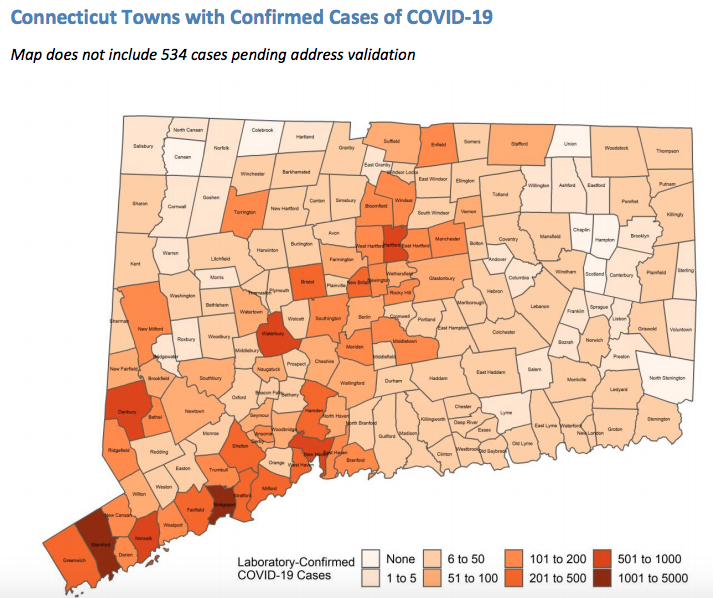
Image from state government website
Municipal comparisons for positive-test COVID-19 cases across the state as of Thursday, April 16, 2020
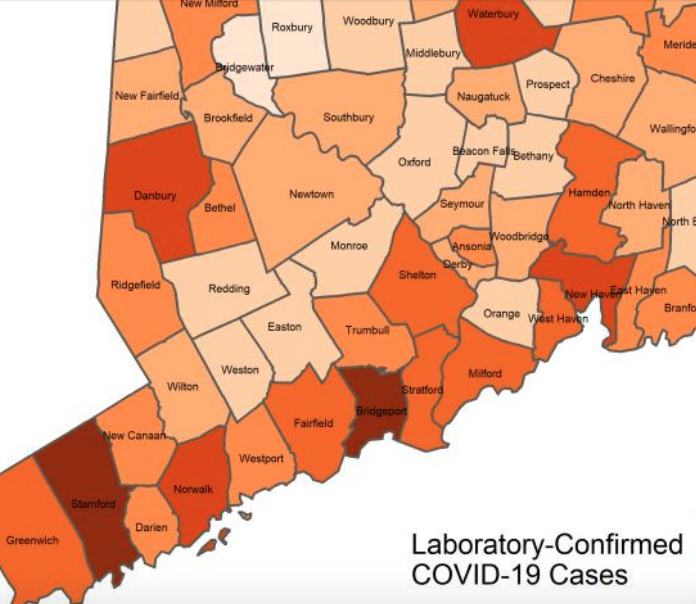
Image from state government website
Closeup of the map above, showing southwest Connecticut
THURSDAY COVID-19 Briefing by Gov. Lamont
Thursday, April 16 — An announcement today from Gov. Ned Lamont’s office:
As the State of Connecticut continues taking actions in response to the global spread of coronavirus disease (COVID-19), Governor Ned Lamont provided the following updates as of 6:00 p.m. on Thursday, April 16, 2020:
Data updates on testing in Connecticut
Since yesterday’s update, an additional 1,129 positive COVID-19 cases have been reported in Connecticut, bringing the statewide total to 15,884. To date, more than 53,122 patients have been tested in Connecticut. Approximately 1,926 patients are hospitalized. The total statewide total number of COVID-19 associated fatalities is 971. It should be noted that the day-to-day changes reflect newly reported cases, deaths, and tests that occurred over the last several days to week.
A county-by-county breakdown includes:
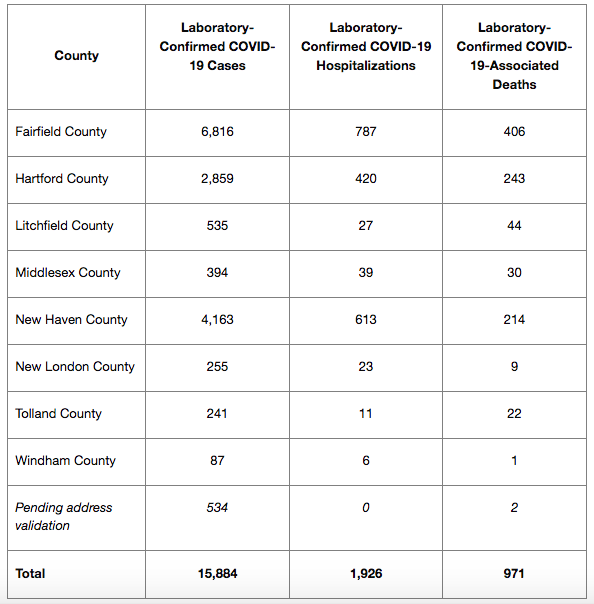 For several additional graphs and tables containing more data, including a list of cases in every municipality, visit ct.gov/coronavirus.
For several additional graphs and tables containing more data, including a list of cases in every municipality, visit ct.gov/coronavirus.
List of nursing homes with residents who have tested positive for COVID-19
The following is a list of every nursing home in Connecticut with residents who have tested positive for COVID-19, along with corresponding data related to the number of cases and fatalities among residents in each facility. Because the collection of this data is a manual process, it is anticipated moving forward that this list will be updated on a weekly basis.
| Town | Nursing home | Licensed beds | Residents with COVID-19 | COVID-19 associated deaths among residents |
| Bethel | Bethel Health Care Center | 161 | 18 | 2 |
| Bloomfield | Bloomfield Center for Nursing and Rehabilitation | 120 | 11 | 4 |
| Bloomfield | Caleb Hitchcock Health Center | 60 | 2 | 1 |
| Bloomfield | Touchpoints at Bloomfield | 150 | 20 | 6 |
| Branford | Branford Hills Health Care Center | 190 | 20 | 3 |
| Bridgeport | Jewish Senior Services | 294 | 23 | 6 |
| Bridgeport | Northbridge Healthcare Center | 145 | 6 | 2 |
| Bristol | Countryside Manor of Bristol | 90 | 11 | 3 |
| Bristol | Sheridan Woods Health Care Center | 146 | 24 | 7 |
| Canton | Cherry Brook Health Care Center | 100 | 11 | 2 |
| Cheshire | Elim Park Baptist Home | 90 | 1 | – |
| Chester | Aaron Manor Nursing and Rehabilitation | 60 | 15 | 3 |
| Cromwell | Apple Rehab Cromwell | 85 | 2 | – |
| Danbury | Glen Hill Center | 100 | 2 | 1 |
| Danbury | Saint John Paul II Center | 141 | 23 | 9 |
| Danbury | Western Rehabilitation Care Center | 120 | 13 | 7 |
| East Hartford | Riverside Health & Rehabilitation Center | 345 | 38 | 10 |
| East Haven | Apple Rehab Laurel Woods | 120 | 14 | 3 |
| East Haven | Whispering Pines | 90 | 32 | 14 |
| East Windsor | Fresh River Healthcare | 140 | 3 | – |
| Enfield | Parkway Pavilion Health and Rehabilitation Center | 130 | 45 | 8 |
| Fairfield | Cambridge Health and Rehabilitation Center | 160 | 12 | 7 |
| Fairfield | Carolton Chronic & Convalescent | 229 | 21 | 3 |
| Fairfield | Ludlowe Center for Health & Rehabilitation | 144 | 12 | 3 |
| Farmington | Touchpoints at Farmington | 105 | 20 | 2 |
| Glastonbury | Glastonbury Health Care Center | 105 | 17 | 5 |
| Glastonbury | Salmon Brook Rehab and Nursing | 130 | 9 | 4 |
| Greenwich | Greenwich Woods | 217 | 13 | 4 |
| Greenwich | Nathaniel Witherall | 202 | 25 | 3 |
| Greenwich | RegalCare at Greenwich | 75 | 1 | – |
| Guilford | Guilford House | 75 | 1 | – |
| Hamden | Arden House | 360 | 16 | 2 |
| Hamden | Hamden Rehabilitation & Health Care Center | 153 | 13 | 4 |
| Hamden | Whitney Rehabilitation Care Center | 150 | 2 | – |
| Hartford | Chelsea Place | 234 | 16 | 5 |
| Hartford | Trinity Hill Care Center | 144 | 25 | 1 |
| Manchester | Crestfield Rehabilitation Center | 155 | 9 | 2 |
| Manchester | Manchester Manor Health Care Center | 126 | 8 | – |
| Manchester | Touchpoints at Manchester | 131 | 27 | 4 |
| Manchester | Westside Care Center | 162 | 1 | – |
| Meriden | Curtis Home | 60 | 6 | 1 |
| Middletown | Middlesex Health Care Center | 150 | 15 | 1 |
| Middletown | Water’s Edge Center for Health & Rehabilitation | 150 | 8 | 1 |
| Milford | Golden Hill Rehab Pavilion | 120 | 67 | 9 |
| Milford | Milford Health and Rehabilitation Center | 120 | 13 | 1 |
| Milford | West River Rehab Center | 120 | 7 | 2 |
| Naugatuck | Glendale Center | 120 | 17 | – |
| New Britain | Grandview Rehabilitation and Healthcare Center | 160 | 18 | 4 |
| New Canaan | Waveny Care Center | 76 | 11 | 9 |
| New Haven | Grimes Center | 114 | 58 | 1 |
| New Haven | RegalCare at New Haven | 150 | 8 | – |
| New Haven | The Mary Wade Home | 94 | 8 | 1 |
| New London | Harbor Village | 128 | 5 | 1 |
| New Milford | Village Crest Center for Health & Rehabilitation | 95 | 4 | – |
| Newington | Bel Air Manor | 71 | 2 | 1 |
| Newington | Newington Rapid Recovery Rehab Center | 180 | 20 | 2 |
| North Haven | Montowese Health & Rehabilitation Center | 120 | 10 | 2 |
| Norwalk | Autumn Lake Healthcare at Norwalk | 150 | 13 | 8 |
| Norwalk | Cassena Care at Norwalk | 150 | 11 | 2 |
| Plainville | Apple Rehab Farmington Valley | 160 | 7 | – |
| Portland | Portland Care and Rehabilitation | 65 | 16 | 4 |
| Ridgefield | Laurel Ridge Health care Center | 126 | 12 | 1 |
| Rocky Hill | 60 West | 95 | 4 | – |
| Rocky Hill | Apple Rehab Rocky Hill | 120 | 28 | 5 |
| Rocky Hill | Maple View Health & Rehabilitation Center | 120 | 4 | 1 |
| Seymour | Shady Knoll Health Center | 128 | 30 | 9 |
| Sharon | Sharon Health Care Center | 88 | 7 | – |
| Shelton | Apple Shelton Lakes | 106 | 40 | 13 |
| Shelton | Bishop-Wicke Health and Rehabilitation | 120 | 22 | 12 |
| Shelton | Gardner Heights Health Care Center | 130 | 42 | 15 |
| Shelton | Hewitt Health & Rehabilitation Center | 160 | 4 | – |
| Simsbury | McLean Health Center | 89 | 11 | – |
| Southbury | Lutheran Home of Southbury | 120 | 7 | 1 |
| Southington | Summit at Plantsville | 150 | 3 | 1 |
| Southport | RegalCare at Southport | 120 | 4 | – |
| Stafford Springs | Evergreen Health Care Center | 180 | 30 | 10 |
| Stamford | Cassena Care at Stamford | 156 | 34 | 5 |
| Stamford | Edgehill Health Center | 46 | 18 | 4 |
| Stamford | Long Ridge Post-Acute Care | 120 | 8 | – |
| Stamford | St. Camillus Center | 124 | 20 | 4 |
| Stamford | The Villa at Stamford | 128 | 13 | 2 |
| Stratford | Lord Chamberlain Nursing and Rehabilitation Center | 190 | 23 | 9 |
| Suffield | Suffield House | 128 | 35 | 8 |
| Torrington | Litchfield Woods | 160 | 38 | 12 |
| Torrington | RegalCare at Torrington | 75 | 9 | 5 |
| Torrington | Valerie Manor | 151 | 3 | 1 |
| Torrington | Wolcott Hall Nursing Center | 87 | 7 | 2 |
| Trumbull | Maefair Health Care Center | 134 | 19 | 3 |
| Trumbull | St. Joseph’s Center | 269 | 23 | 4 |
| Vernon | Fox Hill Center | 150 | 17 | 1 |
| Wallingford | Quinnipiac Valley Center | 180 | 6 | 1 |
| Wallingford | Skyview Rehab and Nursing | 97 | 1 | – |
| Waterbury | Abbott Terrace Health Center | 205 | 69 | 15 |
| Waterbury | RegalCare at Waterbury | 120 | 12 | 2 |
| Waterbury | Waterbury Gardens Nursing and Rehabilitation | 150 | 31 | 5 |
| Waterford | Bayview Health Care | 127 | 28 | 1 |
| Waterford | New London Sub-Acute and Nursing | 120 | 3 | – |
| West Hartford | Hebrew Center for Health and Rehabilitation | 257 | 7 | – |
| West Hartford | Hughes Health and Rehabilitation | 170 | 8 | 2 |
| West Hartford | Saint Mary Home | 256 | 6 | 2 |
| West Hartford | The Reservoir | 75 | 3 | – |
| West Hartford | West Hartford Health and Rehabilitation Center | 160 | 8 | 3 |
| West Haven | RegalCare at West Haven | 98 | 6 | – |
| Wilton | Wilton Meadows Health Care Center | 148 | 6 | 4 |
| Windsor | Kimberly Hall North | 150 | 17 | 9 |
| Windsor | Kimberly Hall South | 180 | 8 | – |
| Windsor | Windsor Health and Rehabilitation Center | 108 | 30 | 4 |
| Woodbridge | The Willows | 90 | 43 | 9 |
| TOTAL | 1713 | 375 | ||
Connecticut Department of Labor processed 60,000 unemployment claims last night utilizing new software improvements
The Connecticut Department of Labor successfully processed 60,000 unemployment claims overnight utilizing the new software improvements the agency deployed yesterday in response to the overwhelming surge in claim applications resulting from the COVID-19 pandemic. Additional claims will continue to be processed through this new system, helping to expedite the process.
Emails containing next steps that claimants need to take to receive their benefits have been delivered to those whose applications were processed. In addition to checking inboxes, claimants are reminded to check any spam or junk folders for the email.
Since March 13, the department received more than 350,000 applications, nearly the same amount that it typically receives over a two-year period. Approximately 174,000 of those applications had already been manually processed prior to the deployment of yesterday’s software improvements. Paired with the continued manual processing, the originally anticipated six-week wait period is expected to be shortened to one week or less.
CHEFA announces FY 2021 COVID-19 grant program
The board of directors of the Connecticut Health and Educational Facilities Authority (CHEFA) voted at its April 15 meeting to replace their typical three grant cycles (client, nonprofit, and targeted) for FY 2021 to respond to the COVID-19 pandemic.
The FY 20201 CHEFA COVID-19 Grant Program will focus on funding statewide efforts that are currently, or plan to be, launched by 501 (c)(3) Connecticut nonprofit entities within the next few months to respond to the crisis.
The efforts can be focused on statewide programs to support Connecticut communities and residents or can be sector specific statewide funds focused on one or more of CHEFA’s four core priority areas of health care, education, child care, and cultural.
Organizations seeking details may contact Betty Sugarman Weintraub, CHEFA Grant Program Manager, for more information at 860-761-8428 or bweintraub@chefa.com.
Governor Lamont encourages residents to sign up for the state’s CTAlert notification system
Governor Lamont is encouraging Connecticut residents to sign up for CTAlert, the state’s emergency alert system, which provides text message notifications to users. To subscribe, text the keyword COVIDCT to 888-777.
Providing information to Connecticut residents
For the most up-to-date information from the State of Connecticut on COVID-19, including an FAQ and other guidance and resources, residents are encouraged to visit ct.gov/coronavirus.
Individuals who have general questions that are not answered on the website can also call 2-1-1 for assistance. The hotline is available 24 hours a day and has multilingual assistance and TDD/TTY access. It intended to be used by individuals who are not experiencing symptoms but may have general questions related to COVID-19. Anyone experiencing symptoms is strongly urged to contact their medical provider.
Why You Should Never Flush Wipes Down the Toilet
Thursday, April 16, 1:09 p.m. — This episode destined for an important chapter in Greenwich history should forever be seared into your conscience the next time you reach toward your toilet with a — well, with anything other than toilet paper (Darien’s wastewater goes to a treatment plant in Stamford, and Stamford and Darien customers have been told in the past to be careful about this, so it’s not just some Greenwich thing):
From a GreenwichFreePress.com article:
Don’t Flush Those Wipes down the Toilet!
[Greenwich First Selectman Fred] Camillo reminded residents that sanitizing wipes, paper towels, face masks and gloves must NOT be flushed down the toilet.
On Tuesday, a Department of Public Works crew had to repair a wastewater pump station which broke down because it became clogged with these items, according to Public Works Commissioner Amy Siebert.
“This preventable equipment malfunction is regrettable on several fronts especially since the crew had to work in very close quarters in order to effectuate repairs,” Camillo said in his daily release to media.
And here’s some further education on this:
—Americans Coping With the Coronavirus Are Clogging Toilets (New York Times, March 21) “Many are then tossing the disinfectant wipes, paper towels and other paper products they used into the toilet. The result has been a coast-to-coast surge in backed-up sewer lines and overflowing toilets, according to plumbers and public officials, who have pleaded with Americans to spare the nation’s pipes from further strain.”
—Water treatment utilities say people are flushing cleaning wipes. Don’t do it! (Washington Post, April 1)
—Disinfecting wipes are being flushed down toilets and causing major pipe problems (CNN, March 20)
WEDNESDAY State Statistics on COVID-19 Cases in Lower Fairfield County
Wednesday, April 15 — As of Wednesday, 137 Darienites (adjusted downward from the 139 reported on Monday, April 13) have been identified with COVID-19, according to information released by state authorities. (Reminders: Many people are thought to have the COVID-19 virus who aren’t identified; the state says “all figures are preliminary and subject to change.”)
- NOTE: First Selectman Jayme Stevenson has pointed out that the state-released numbers don’t appear to be as up-to-date as what the town Health Department is receiving. The count that the town government has (from her Facebook timeline): “149 cases, 8 hospitalizations, 4 deaths.”
Here’s the number of identified cases in nearby communities, according to the state government Coronavirus statistics updates Web page:
Stamford — 1,583 cases (97 more than the 1,486 on Monday)
Norwalk — 803 (58 more than the 747 on Monday)
New Canaan — 99 (eight more than the 91 on Monday)
Greenwich — 349 (25 more than the 324 on Monday)
Westport — 178 (four more than the 174 on Monday)
Wilton — 99 (four more than the 95 on Monday)
Weston — 42 (two more than the 40 on Monday)
Ridgefield — 130 (five more than the 126 on Monday)
Fairfield — 220 (23 more more than the 197 on Monday)
Bridgeport — 919 (133 more than the 786 on Monday)
TOP TEN CONNECTICUT MUNICIPALITIES (with total cases): 1. Stamford (1,583), 2. Bridgeport (919), 3. Norwalk (803), 4. New Haven (776), 5. Danbury (754),6. Waterbury (676), 7. Hartford (492), 8. Greenwich (349), 9. West Haven (337), 10. Stratford (297)
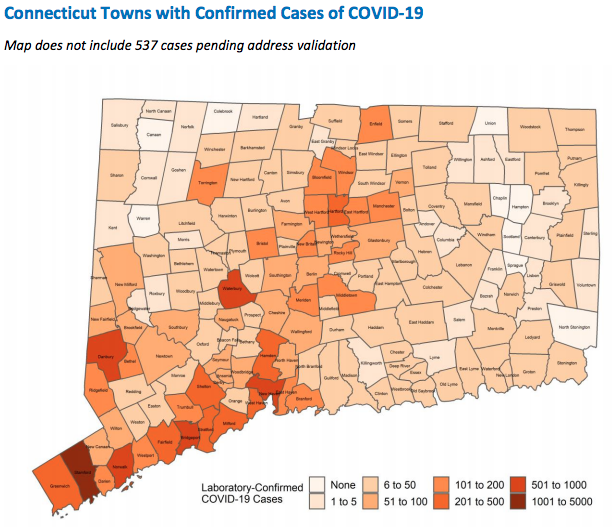
Image from state government website
COVID-19 positive test results by resident’s city or town, as of April 15, 2020
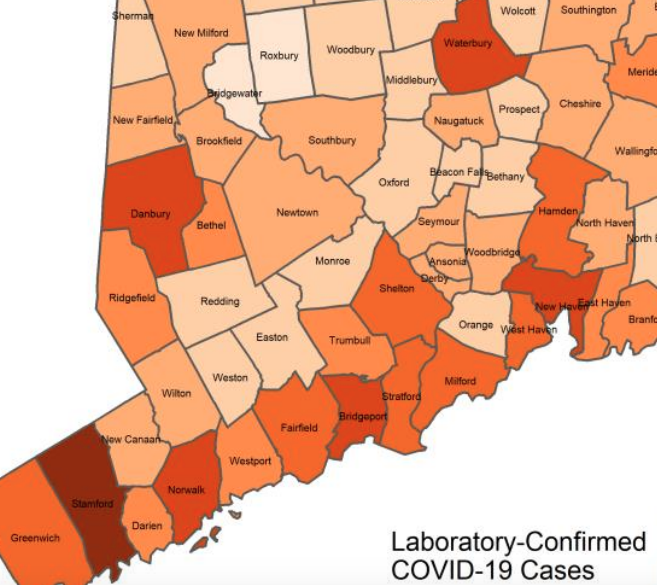
Image from state government website
Closeup of southwest Connecticut, from the map above
WEDNESDAY COVID-19 Briefing by Gov. Lamont
Wednesday, April 15 — An announcement today from Gov. Ned Lamont’s office:
As the State of Connecticut continues taking actions in response to the global spread of coronavirus disease (COVID-19), Governor Ned Lamont provided the following updates as of 6:00 p.m. on Wednesday, April 15, 2020:
Data updates on testing in Connecticut
Since yesterday’s update, an additional 766 positive COVID-19 cases have been reported in Connecticut, bringing the statewide total to 14,755. To date, more than 50,143 patients have been tested in Connecticut. Approximately 1,908 patients are hospitalized. The total statewide total number of COVID-19 associated fatalities is 868. It should be noted that the day-to-day changes reflect newly reported cases, deaths, and tests that occurred over the last several days to week.
A county-by-county breakdown includes:
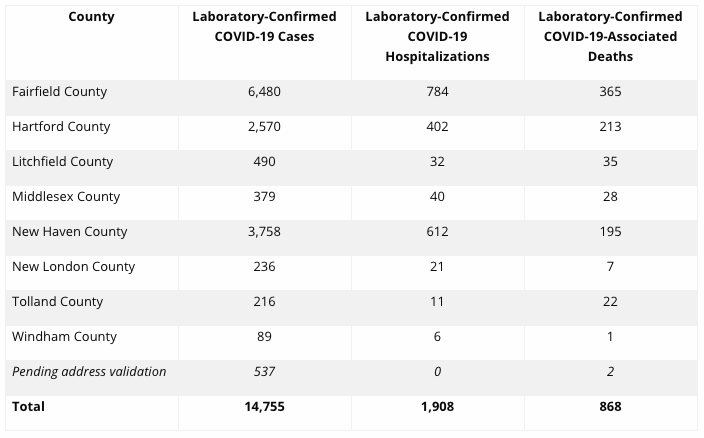
Image from the state government website
COVID-19, county by county, statistics for Wednesday, April 15, 2020
For several additional graphs and tables containing more data, including a list of cases in every municipality, visit ct.gov/coronavirus.
Governor Lamont signs executive order waiving the moratorium on Medicaid beds at certain long-term care facilities
Governor Lamont today signed an executive order making further adjustments to certain statutes and regulations regarding long-term care facilities as part of the administration’s ongoing plan to keep protect and support the vulnerable population of residents who live in nursing homes during the COVID-19 public health emergency.
Last weekend, Governor Lamont signed Executive Order No. 7Y, which implemented the state’s nursing home surge plan and includes the designation of certain long-term care facilities as COVID-19 recovery centers that will focus on supporting people discharged from hospitals.
To accommodate this emergency need, Governor Lamont today signed Executive Order No. 7AA, which permits the Department of Social Services to temporarily waive the statutory moratorium on new beds at certain nursing homes to accommodate COVID-19-related needs.
For more information related to the plan for long-term care facilities during the COVID-19 pandemic, read the list of frequently asked questions (FAQs).
This is the 28th executive order Governor Lamont has signed since enacting the emergency declarations last month.
| **Download: Governor Lamont’s Executive Order No. 7AA |
Connecticut Insurance commissioner approves no-cost life insurance coverage for front-line health care workers
Connecticut Insurance Commissioner Andrew N. Mais today announced that front-line health care workers in Connecticut and Massachusetts may soon be eligible to receive up to $25,000 of life insurance at no cost. The Connecticut Insurance Department has expedited approval of HealthBridge, a new Massachusetts Mutual Life Insurance Company (MassMutual) life insurance product that offers no-cost, guaranteed issue policies to front-line health care workers during the COVID-19 pandemic.
The new HealthBridge coverage allows health care and other workers on the front lines of the pandemic to directly enroll for a no-premium payment three-year life insurance policy with a $25,000 death benefit for issue ages 18 to 50. Workers with issue ages 51 to 60 will receive a no-cost $10,000 death benefit.
Eligible individuals must be employed at a licensed hospital, urgent care center, or with an emergency medical services provider in Connecticut or Massachusetts and have exposure to COVID-19 patients. In addition to doctors and nurses, lab technicians, custodial staff, maintenance crews, cafeteria workers, and security personnel will also be considered for coverage. More details and enrollment information is available on MassMutual’s HealthBridge website.
“Innovative products like HealthBridge provide much needed peace of mind and security for those working on the front lines of this pandemic who give so much of themselves for all of us,” Commissioner Mais said. “When the company first reached out to us with this idea, we immediately started working to expedite approval so front-line healthcare workers can benefit from the support life insurance can offer.”
For more information, read the press release issued today by the Connecticut Insurance Department.
Connecticut Insurance Department announces fully-insured health plan members can receive COVID-19 treatment with no out-of-pocket costs
All fully-insured plan health plan members, including those with high-deductible health plans, can now receive COVID-19 testing and treatment with no out-of-pocket costs.
Some employers, especially large ones, sponsor self-funded health plans. Insurance Commissioner Andrew N. Mais urges those employers to waive testing and treatment costs as well.
Medicaid and the Children’s Health Insurance Program, together known as HUSKY Health in Connecticut, are also fully covering COVID-19 testing and treatment without any cost-sharing. Consumers should take note that there are some differences among commercial plans and policyholders should contact their insurer or employer to obtain additional information on important details.
For more information, read the press release issued today by the Connecticut Insurance Department.
Access Health CT special enrollment period ends Friday, April 17
Access Health CT, Connecticut’s health insurance marketplace, is reminding residents that the special enrollment period for the state’s uninsured population ends this Friday, April 17. Uninsured individuals can sign up for health insurance coverage through Access Health CT during this time. The effective date for enrollment during this special enrollment period that were completed after April 2 will be May 1.
The only way to sign up for this new special enrollment period is by calling 855-365-2428.
In the last month, 1,920 previously uninsured residents have enrolled in health insurance plans through the special enrollment period.
“We are experiencing a public health crisis,” Access Health CT CEO James Michel said. “In addition to social distancing and staying home, making sure that you are covered with a quality health insurance plan is a great way to help you and your family stay healthy. If you are uninsured, make sure to call before midnight on Friday.”
Individuals who experience a qualifying life event (such as losing coverage due to a job change, moving to Connecticut, getting married, having/adopting a child, etc.) or qualify for Medicaid/Children’s Health Program (CHIP) can always enroll online, including in-person or over the phone and all help is free.
For more information on the special enrollment period, visit learn.accesshealthct.com.
Governor Lamont encourages residents to sign up for the state’s CTAlert notification system
Governor Lamont is encouraging Connecticut residents to sign up for CTAlert, the state’s emergency alert system, which provides text message notifications to users. To subscribe, text the keyword COVIDCT to 888-777.
Providing information to Connecticut residents
For the most up-to-date information from the State of Connecticut on COVID-19, including an FAQ and other guidance and resources, residents are encouraged to visit ct.gov/coronavirus.
Individuals who have general questions that are not answered on the website can also call 2-1-1 for assistance. The hotline is available 24 hours a day and has multilingual assistance and TDD/TTY access. It intended to be used by individuals who are not experiencing symptoms but may have general questions related to COVID-19. Anyone experiencing symptoms is strongly urged to contact their medical provider.
Metro-North 3 PM Horn on Thursday to Honor Transit Workers
Wednesday, April 15 — At 3 p.m., Thursday, listen for train horns: Trains and other Metro-North vehicles will blast their horns twice to honor transportation workers, many of whom have found their jobs significantly more dangerous as the COVID-19 pandemic spreads through the area, and a number of whom have died.
Metro-North issued this brief announcement of the event late Wednesday afternoon:
“Join us as at Metro-North, as transportation agencies honor transportation workers. On Thursday, April 16, trains, buses and ferries will give two horn blasts at 3 p.m. Join us as we #SoundTheHorn!”
Gov Lamont Applies to Federal Government for Reimbursement of COVID-19 Costs
Wednesday, April 15 — An announcement today from Gov. Ned Lamont’s office:
Gov. Ned Lamont today announced that he has submitted a supplementary request with the support of Connecticut’s Congressional delegation to the President of the United States for enhanced federal financial support toward the state’s ongoing response to the COVID-19 pandemic.
The governor is requesting that the federal government enhance its support to Connecticut citizens by authorizing the Federal Emergency Management (FEMA) cover 100% of the costs Connecticut has incurred to save lives and protect public health and safety and to the extend financial assistance directly to affected Connecticut residents.
Further, the governor’s letter confirms that President Trump’s March 27 Major Disaster Declaration includes the tribal nations of the Mashantucket Pequot Tribal Nation and the Mohegan Tribal Nation; reiterates Connecticut’s request for access to FEMA’s Individual Assistance Program, which would provide direct assistance to residents; and requests Connecticut be made eligible for the federal Hazard Mitigation Grant Program should the president authorize state’s access to the program.
Under the currently approved Major Disaster Declaration for Connecticut, FEMA will reimburse 75% of eligible COVID-19 expenses for state and local governments, as well as the tribal nations.
“The size and scope of this public health emergency is unprecedented,” Lamont said. “The president has acknowledged this in declaring a major disaster in every state in the nation. If approved, this request would bring much needed additional financial assistance to the state and our municipalities.”
Lamont also thanked the president for the previously announced approval of 100% reimbursement for the costs associated with activation of the Connecticut National Guard, which is providing the state with support during emergency response to the pandemic.
This is a state activation of the Guard, meaning that Governor Lamont continues to command its forces through Connecticut’s Adjutant General and Joint Staff.
TUESDAY COVID-19 Briefing by Gov. Lamont
As the State of Connecticut continues taking actions in response to the global spread of coronavirus disease (COVID-19), Governor Ned Lamont provided the following updates as of 6:00 p.m. on Tuesday, April 14, 2020:
Data updates on testing in Connecticut
Since yesterday’s update, an additional 608 positive COVID-19 cases have been reported in Connecticut, bringing the statewide total to 13,989. To date, more than 45,841 patients have been tested in Connecticut. Approximately 1,779 patients have been hospitalized. The total statewide total number of COVID-19 associated fatalities is 671. It should be noted that the day-to-day changes reflect newly reported cases, deaths, and tests that occurred over the last several days to week.
A county-by-county breakdown includes:
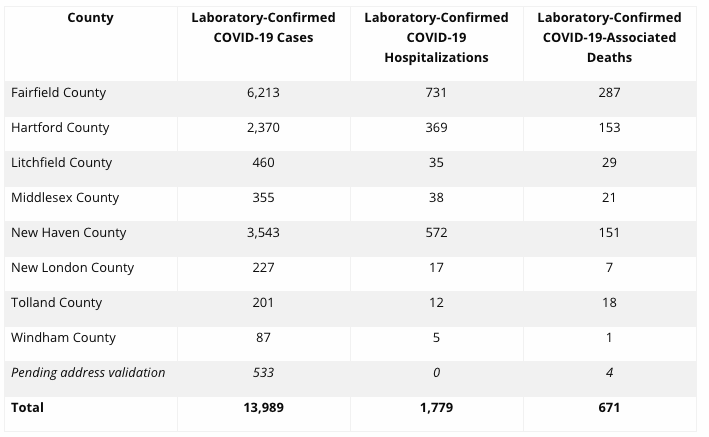
Image from the state government website
COVID-19, county by county for Tuesday, April 14, 2020
For several additional graphs and tables containing more data, including a list of cases in every municipality, visit ct.gov/coronavirus.
Governor Lamont signs 27th executive order to mitigate the spread of COVID-19
Governor Lamont today signed another executive order – the 27th since he enacted the emergency declarations – that builds upon his efforts to encourage mitigation strategies that slow down transmission of the virus. Executive Order No. 7Z enacts the following provisions:
- Modification of state contracting statutes to facilitate the emergency procurement of essential goods: Temporarily waives certain requirements related to state contracts in order to expedite the procurement of essential goods and services, including personal protective equipment (PPE), that are needed urgently to respond to the COVID-19 pandemic.
- In-person attendance requirement suspended for assessment appeals: Allows property owners or their attorney or agent to appear before a board of assessment appeals using remote technology instead of in person.
- Suspension of requirements for security officer license: Authorizes the commissioner of the Department of Emergency Services and Public Protection to waive licensing requirements to temporarily allow security services or businesses to employ security officers who are not licensed in Connecticut but are licensed in another state, to address a shortage of available security officers. This applies only to unarmed security officers.
| **Download: Governor Lamont’s Executive Order No. 7Z |
State partners with CBIA and CONNSTEP to help Connecticut manufacturers retool operations to meet medical supply needs during pandemic
The State of Connecticut is partnering with the Connecticut Business and Industry Association (CBIA) and its affiliate CONNSTEP in an effort that will facilitate collaboration between the state’s manufacturers that are retooling their operations to make critically needed medical equipment and supplies, and the health care institutions that are experiencing specific shortages. The effort is focused on using manufacturers as non-traditional sources to meet needs that currently can’t be met in the market, which has become overwhelmed as global demand has dramatically increased.
Through the creation of a new website by CONNSTEP – www.ctcovidresponse.org – manufacturers will be able to obtain information on the current supply needs in Connecticut, make connections with suppliers, and ultimately provide the products to health care institutions. The Connecticut Department of Administrative Services has a purchasing team that is generating and following sourcing leads for traditional manufacturers, distributors, and other sources.
The initiative is a collaborative project between CONNSTEP, CBIA, the Connecticut Department of Administrative Services, the state’s Chief Manufacturing Officer, the Connecticut Hospital Association, and others.
Department of Revenue Services extends filing and payment deadlines for certain state tax returns
To provide relief to Connecticut taxpayers during the COVID-19 outbreak, the Connecticut Department of Revenue Services is extending the filing and payment deadlines of certain returns until July 15, 2020. These extensions align Connecticut tax filing and payment dates with filing and payment extensions recently announced by the Internal Revenue Service.
“In general, Connecticut tax filings are based on submission of the corresponding federal return,” Acting Revenue Services Commissioner John Biello said. “The filing and payment extensions announced by DRS today keep Connecticut in line with recent federal updates and, in these difficult circumstances, offer taxpayers and tax professionals clarity and more time to prepare their returns.”
The following Connecticut returns have been extended until July 15, 2020:
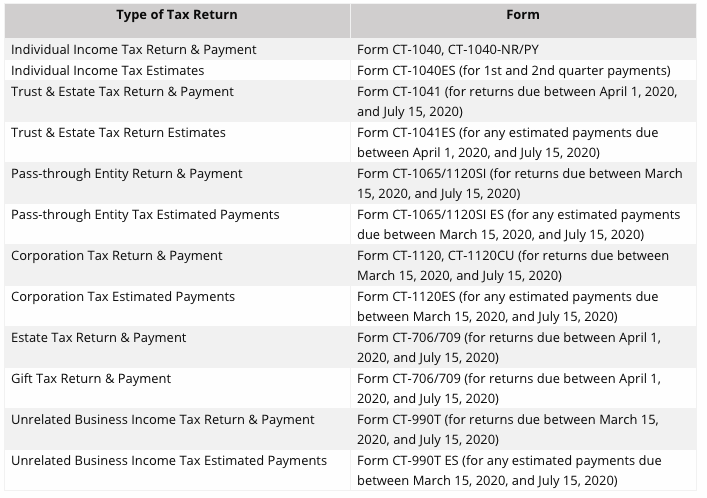
Image from the state government website
Connecticut tax return extensions
For more information, read the press release issued today by the Department of Revenue Services.
Governor Lamont encourages residents to sign up for the state’s CTAlert notification system
Governor Lamont is encouraging Connecticut residents to sign up for CTAlert, the state’s emergency alert system, which provides text message notifications to users. To subscribe, text the keyword COVIDCT to 888-777.
Providing information to Connecticut residents
For the most up-to-date information from the State of Connecticut on COVID-19, including an FAQ and other guidance and resources, residents are encouraged to visit ct.gov/coronavirus.
Individuals who have general questions that are not answered on the website can also call 2-1-1 for assistance. The hotline is available 24 hours a day and has multilingual assistance and TDD/TTY access. It intended to be used by individuals who are not experiencing symptoms but may have general questions related to COVID-19. Anyone experiencing symptoms is strongly urged to contact their medical provider.
Stevenson: Darien COVID-19 Counts for Monday
Tuesday, April 14, 11 a.m. — First Selectman Jayme Stevenson released these COVID-19 statistics, including tested positive cases, as of Monday, April 13 for Darien residents (it doesn’t matter where they were tested:
—140 cases*
—8 hospitalizations
—2 deaths
*Town data may not correlate with state report.
MONDAY COVID-19 Briefing by Gov. Lamont
Tuesday, April 14, 10:10 a.m. — As the State of Connecticut continues taking actions in response to the global spread of coronavirus disease (COVID-19), Governor Ned Lamont provided the following updates as of 7 p.m. on Monday, April 13, 2020:
Data updates on testing in Connecticut
Since yesterday’s update, an additional 1,346 positive COVID-19 cases have been reported in Connecticut, bringing the statewide total to 13,381. To date, more than 44,309 patients have been tested in Connecticut.
Approximately 1,760 patients have been hospitalized. The total statewide total number of COVID-19 associated fatalities is 602. It should be noted that the day-to-day changes reflect newly reported cases, deaths, and tests that occurred over the last several days to week.
A county-by-county breakdown includes:
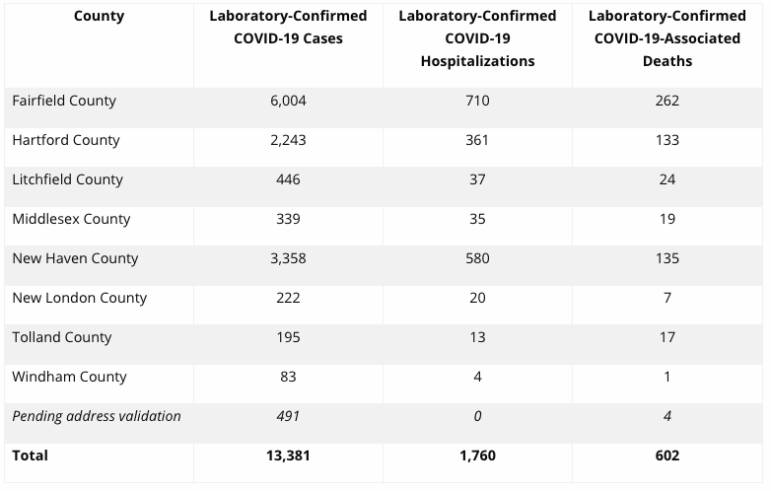
Table from state government website
County-by-county COVID-19 statistics for April 13
For several additional graphs and tables containing more data, including a list of cases in every municipality, visit ct.gov/coronavirus.
Connecticut Department of Social Services announces infusion of emergency food assistance funding for food banks
The Connecticut Department of Social Services (DSS) today announced the allocation of over $3.8 million in federal food assistance to two of the state’s largest food banks, including the Connecticut Food Bank, which will receive $1.9 million for food and nearly $650,000 for administrative costs, and Foodshare, which will receive nearly $1 million for food and $300,00 for administrative costs.
The funding comes from the Families First Coronavirus Response Act of 2020 and The Emergency Food Assistance Program (TEFAP).
The funding will enable both of these organizations to increase their orders of TEFAP foods (including canned, frozen and fresh fruits and vegetables, eggs, meat, poultry, fish, nuts, milk and cheese, and whole-grain and enriched grain products like rice, cereal, and pasta) through the U.S. Department of Agriculture food-ordering system.
It will also help meet the increased demand for food in the community through the statewide network of food pantries, soup kitchens and distribution sites. Administrative costs cover trucking/delivery, warehousing, refrigerating, and staffing.
In addition, the recently adopted Coronavirus Aid, Relief and Economic Security Act (CARES Act) is anticipated to provide additional TEFAP funding for Connecticut.
DSS is waiting for guidance from the USDA’s Food and Nutrition Service about the state’s allocation and when the aid will be available. Those funds are also expected to be allocated to the Connecticut Food Bank and Foodshare.
AdvanceCT forms group of health and business experts who will provide recommendations to the Lamont administration on the reopening of Connecticut’s economy
The nonprofit organization AdvanceCT today announced that it is forming the Reopen Connecticut Advisory Group, which will consist of experts within the state’s medical and business community who will examine issues concerning how best to reopen the state’s economy as the nation emerges from the unprecedented public health emergency caused by COVID-19. Established and governed by AdvanceCT, the group will consult with the state and regional partners and experts on next steps, and will remain in frequent contact with the Lamont administration.
The advisory group will be co-chaired by Indra Nooyi, who the current board co-chair of AdvanceCT and the former chairman and CEO of PepsiCo, and Albert Ko MD, who is a professor of Epidemiology and Medicine and a department chair at the Yale School of Public Health. Other senior advisors will include Ezekiel Emanuel, who serves as Vice Provost for Global Initiatives and chair of the Department of Medical Ethics and Health Policy at the University of Pennsylvania, and Scott Gottlieb, who is a former commissioner of the Food and Drug Administration. AdvanceCT expects to announce additional members in the coming days.
“I’ve always been a believer that collaboration and relying on experts is the best way to be successful,” Governor Lamont said. “To make the reopening of Connecticut’s economy work in the best way possible, we must strike a proper balance between public health and the economy. To make this work, we need to make sure that Connecticut has a thoughtful approach to getting our state moving after this unprecedented, global public health emergency.”
For more information, read the press release issued today by Governor Lamont.
Coalition of northeastern governors plan multi-state council on getting people back to work and restoring the economy
Recognizing that their states have one integrated regional economy, the governors of Connecticut, New York, New Jersey, Rhode Island, Massachusetts, Pennsylvania, and Delaware are forming a multi-state council that will work to develop a fully integrated regional framework to gradually lift the states’ stay at home orders while minimizing the risk of increased spread of the virus.
The group will be comprised of one health expert, one economic development expert, and the respective chief of staff from each state. Governor Lamont said that Connecticut’s representatives on the group will include Indra Nooyi, who is the co-chair of the nonprofit organization AdvanceCT and former chairman and CEO of PepsiCo; Albert Ko, MD, who is a professor of Epidemiology and Medicine and a department chair at the Yale School of Public Health; and Paul Mounds Jr., who serves as chief of staff in the Office of the Governor.
“One thing that’s undeniable is that this virus does not stop at the border of any county, state, or country, but the impact is the same when it comes to our respective economies and healthcare systems,” Governor Lamont said. “Working as a regional coalition to make the right decisions will lead to the best public health results for all of our residents. We must solve these problems together.”
For more information, read the press release issued today by Governor Lamont.
Governor Lamont encourages residents to sign up for the state’s CTAlert notification system
Governor Lamont is encouraging Connecticut residents to sign up for CTAlert, the state’s emergency alert system, which provides text message notifications to users. To subscribe, text the keyword COVIDCT to 888-777.
Providing information to Connecticut residents
For the most up-to-date information from the State of Connecticut on COVID-19, including an FAQ and other guidance and resources, residents are encouraged to visit ct.gov/coronavirus.
Individuals who have general questions that are not answered on the website can also call 2-1-1 for assistance. The hotline is available 24 hours a day and has multilingual assistance and TDD/TTY access. It intended to be used by individuals who are not experiencing symptoms but may have general questions related to COVID-19. Anyone experiencing symptoms is strongly urged to contact their medical provider.
National Small Business Group: Our Members May Not Survive
Monday, April 13, 5:12 p.m. — National Small Business Group: Many Small Businesses Can Stay Afloat Only 1 to 2 More Months
The National Federation of Independent Businesses, noting that Northeast governors are working on ways to lift social isolation restrictions, says, “While the business owners do want their employees and customers to be safe, a recent survey by NFIB showed most of these companies’ cash reserves could run out in one to two months making reopening not an option.”
Here’s the full news release:
Today Governors in a handful of Northeastern States held a conference call to discuss a regional plan for reopening the economy when it’s time to lift some restrictions on the public and businesses. NFIB believes it is important to have those discussions now because a huge number of small businesses are in a financial crisis of immense proportions. While the business owners do want their employees and customers to be safe, a recent survey by NFIB showed most of these companies’ cash reserves could run out in one to two months making reopening not an option.
“It may be helpful to have consistent regulations among states, and it is good to know that these Governors are considering a plan to reopen the economy when the time is right, but time is running out quickly for small businesses,” said Tim Goodrich, NFIB Executive Director of State Government Relations. “Small business owners hoped the federal loans might help get them over this very difficult time, but the Paycheck Protection Loan rollout had glitches, and now the Emergency Injury Disaster loans have turned out to be a real disaster.”
NFIB says that the EIDL loans were applied for about a month ago and the money has not yet reached most small businesses that applied. The promised $10,000 upfront grant that a business could apply for if they applied for the EIDL loan was lowered to just $1,000 per employee over concerns the funds would run out. NFIB asks that the SBA work out these problems and get the money to those who so desperately need it immediately.
“This health crisis can cause sickness and death, and it must be addressed, but the risks from the economic crisis are extremely serious too,” said Andrew Markowski, state director of NFIB in Connecticut. “If we don’t save these small businesses that employ around half of the workers in the state, and contribute about half of the state’s GDP, we will have financial and emotional devastation among workers and their families.”
“It will be important for these governors to understand how these small businesses operate and get the business owners’ input to be able to make informed decisions,” said Markowski. “It is in the interest of the employees, customers, and the state that these small businesses open if they can do so safely before it’s too late. The longer they remain shut down it could require many more years to recover.”
First Selectman: State COVID-19 Data Not Reliable
Monday, April 13, 5:04 p.m. — First Selectman Jayme Stevenson wrote this post Sunday on Facebook, stating that “the data integrity from the CT Dept of Health is unreliable” so she won’t be presenting the charts about Darien cases, just the number of cases, hospitalizations and deaths. Here’s the entire post:
- Darien Residents…you will see from the data reported in the link below that the state reports 131 Darien cases. Our Local Health Director who gets the data from the state has been notified of a total of 139 Darien cases, 8 hospitalizations and 2 deaths…8 new cases today. I will not be publishing the charts previously provided as the data integrity from the CT Dept of Health is unreliable. I will continue to provide the number of cases, hospitalizations and deaths every day to the best of my ability. #wedeservebetterdata
MONDAY State Statistics on COVID-19 Cases in Lower Fairfield County
Monday, April 13, 4:51 p.m. — As of Monday, 138 Darienites (two more than on Friday, April 10) have been identified with COVID-19, according to information released by state authorities. (Reminders: Many people are thought to have the COVID-19 virus who aren’t identified; the state says “all figures are preliminary and subject to change.”)
Here’s the number of identified cases in nearby communities, according to the state government Coronavirus statistics updates Web page:
Stamford — 1,486 cases (297 more than the 1,189 on Friday)
Norwalk — 747 (157 more than the 690 on Friday)
New Canaan — 91 (eight more than the 83 on Friday)
Greenwich — 324 (30 more than the 294 on Friday
Westport — 174 (nine more than the 165 on Friday)
Wilton — 95 (four more than the 91 on Friday)
Weston — 40 (three more than the 37 on Friday)
Ridgefield — 126 (five more than the 121 on Friday
Fairfield — 197 (41 more more than the 156 on Friday)
Bridgeport — 786 (154 more than the 632 on Friday)
TOP TEN CONNECTICUT MUNICIPALITIES (with total cases): 1. Stamford (1,486), 2. Bridgeport (786), 3. Norwalk (747), 4. Danbury (726), 5. New Haven (697), 6. Waterbury (594), 7. Hartford (432), 8. Greenwich (324), 9. West Haven (299), 10. Stratford (265)
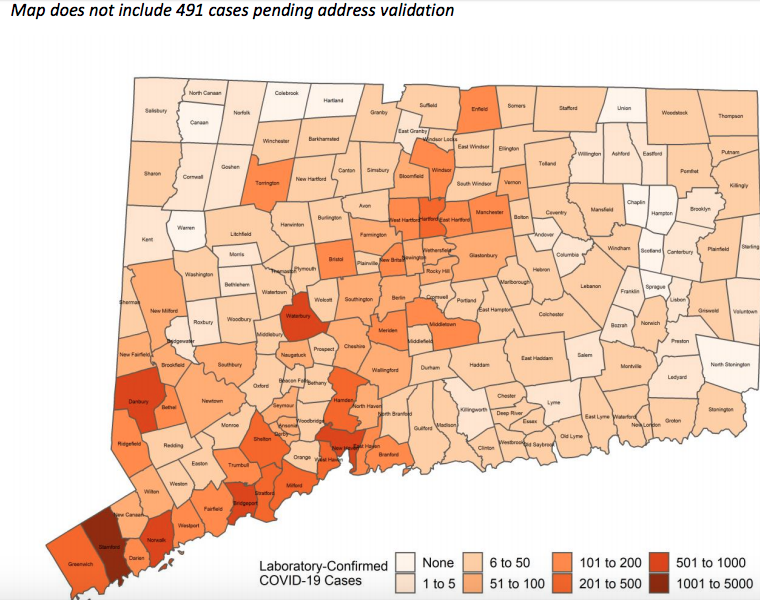
Image from state government website
Confirmed cases of COVID-19 across Connecticut
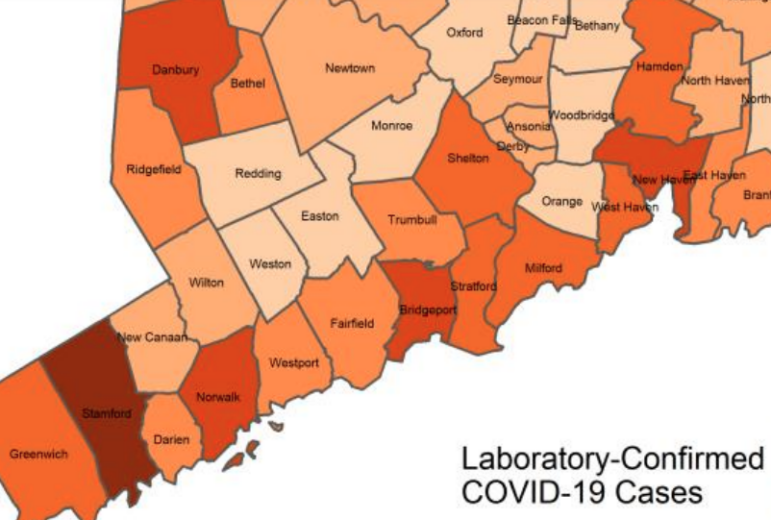
Closeup view of above map: COVID-19 cases, by municipality in southwest Connecticut as of Monday, April 13
CT in Multi-State Effort for Common Strategy to Reduce Social Isolation
Monday, April 13, 4:35 p.m. — Gov. Ned Lamont has announced that Connecticut is taking part in a regional state effort to coordinate how
“to accomplish the goal of easing social isolation without triggering renewed [COVID-19 epidemic] spread — including testing, contact tracing, treatment and social distancing – and will rely on the best available scientific, statistical, social and economic information to manage and evaluate those tools.”
The announcement says nothing about what policies may be adopted or even considered as part of the joint decision-making process and coordination effort.
- Update: Monday, April 13, 5:16 p.m. — “Massachusetts Governor Charlie Baker is joining the multi-state council to restore the economy and get people back to work,” Governor Lamont’s office announced late Monday afternoon.
Here’s the full announcement:
Recognizing that their states have one integrated regional economy, Connecticut Governor Ned Lamont, New York Governor Andrew M. Cuomo, New Jersey Governor Phil Murphy, Rhode Island Governor Gina Raimondo, Pennsylvania Governor Tom Wolf, and Delaware Governor John Carney today announced the creation of a multi-state council to restore the economy and get people back to work.
This announcement builds on the states’ ongoing regional approach to combatting the COVID-19 pandemic.
The coordinating group – comprised of one health expert, one economic development expert and the respective chief of staff from each state – will work together to develop a fully integrated regional framework to gradually lift the states’ stay at home orders while minimizing the risk of increased spread of the virus.
The council will create this framework using every tool available to accomplish the goal of easing social isolation without triggering renewed spread – including testing, contact tracing, treatment and social distancing – and will rely on the best available scientific, statistical, social and economic information to manage and evaluate those tools.
Governor Lamont said, “One thing that’s undeniable is that this virus does not stop at the border of any county, state, or country, but the impact is the same when it comes to our respective economies and healthcare systems. Working as a regional coalition to make the right decisions will lead to the best public health results for all of our residents. We must solve these problems together.”
Governor Cuomo said, “We have been collaborating closely with our neighboring states to combat this pandemic through a uniform approach to social distancing and density reduction and it has been working well. Now it is time to start opening the valve slowly and carefully while watching the infection rate meter so we don’t trigger a second wave of new infections. This is not a light switch that we can just flick on and everything goes back to normal – we have to come up with a smart, consistent strategy to restart the systems we shut down and get people back to work, and to the extent possible we want to do that through a regional approach because we are a regional economy. New York is partnering with these five states to create a multi-state council that will come up with a framework based on science and data to gradually ease the stay at home restrictions and get our economy back up and running.”
Governor Murphy said, “No one has given more thought or is more eager to restart our economy than I am, but if we don’t get the sequencing right, we put more lives at risk. The only path to a sustainable economic recovery is through a strong healthcare recovery. Then, and only then, do we position ourselves to fully ignite our economy and get the residents of our state back to work while minimizing the danger of this disease. A coordinated, regional approach, informed by a multi-state council of experts, will help us avoid a major setback with potentially disastrous consequences. I look forward to the day when the facts on the ground allow us to ease our restrictions and move our regional economy forward.”
Governor Gina Raimondo said, “States are taking the lead as we fight to slow the spread of coronavirus and save lives. I’m proud of the steps we’ve taken, and I’m constantly thinking about what it will take to safely reopen our economy. But we know that this virus does not recognize borders, and it’s clear we need a strong, coordinated regional approach to avoid a second wave of this disease. I’m grateful to my fellow governors for their leadership during this crisis and I’m confident that this new partnership will support our efforts to get Rhode Islanders – and all Americans – back to work safely.”
Governor Tom Wolf said, “Our highest priority remains protecting the health and safety of Pennsylvanians. While my administration continues to take critical steps to mitigate the spread of COVID-19, I also recognize that we must look ahead and take a measured, careful approach to prepare for the future while ensuring that we don’t undo all of our efforts. Pennsylvania will work collaboratively with our partners both in state and in surrounding states to develop a comprehensive strategy that first focuses on health but also addresses the need to gradually restore our economy.”
Governor John Carney said, “We still have a situation in Delaware that is getting worse. Infections of COVID-19 and hospitalizations are rising. Delawareans should stay home. Don’t go out in public unnecessarily. Don’t visit Delaware unless you need to see a doctor, or care for a family member. You’ll only increase everyone’s risk. At the same time, we need to look forward. We need a consistent approach for moving our states out of this crisis, when that day comes. I’m grateful for the partnership of my fellow Governors in the region. They are all working around-the-clock to prevent surges in COVID-19 cases, protect hospital capacity for the most critically-ill patients, and save lives. We’ll get through this by working together.”

